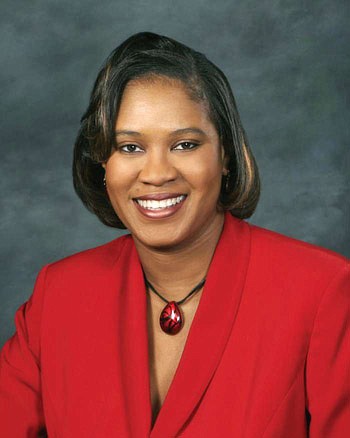
Mayor Alvin Brown is scheduled Wednesday to name state Rep. Mia Jones as Jacksonville’s first health commissioner and to announce a health initiative.
“Cover Jacksonville” will be funded by a $260,000 grant from Cities Expanding Access to Health for Children and Families from the National League of Cities.
The funds will be used to implement a local campaign to enroll children and their parents in Medicaid and the Children’s Health Insurance Program.
Jones said the city designating someone health commissioner was one of the requirements for the grant.
Having the additional title won’t change her function and she will remain special assistant to Brown.
“When I read what they put in the grant, I said ‘I already do this,’” she said Monday.
Jones described Cover Jacksonville as the commitment of the administration and her personal commitment to get more children covered with health insurance.
“Our hope is that it will give us greater visibility,” she said.
She said her role with Cover Jacksonville is separate from her duties with Legislature.
She is paid $7,600 per month by the City, but not while serving in Tallahassee. None of her salary will be funded through the grant.
The planning phase of Cover Jacksonville was conducted with the assistance of the Health Planning Council of Northeast Florida.
Dawn Emerick, the organization’s former executive director, agreed that Jones’ new title will be a continuation of what she’s already been doing for the city.
“She’s a terrific liaison for anything that’s involved with improving health outcomes from children to the elderly,” Emerick said. “This makes it official, makes it more high profile and will help to get these kids enrolled.”
Cover Jacksonville will be administered by the Jacksonville Children’s Commission. The Players Center for Child Health at Wolfson Children’s Hospital, United Way of Northeast Florida, the health planning council and Duval County Public Schools are partners in the program.
Jacksonville is one of eight cities in the U.S., and the only in Florida, to receive the grant.
Chuan Teng, spokeswoman for the league, said Jacksonville has been working with the group since June 2013.
“The Jacksonville Children’s Commission has developed a very strong plan,” Teng said.
It is estimated more than 25,000 children in Duval County are not covered by health insurance, even though they qualify through Medicaid or through the state’s Florida Healthy Kids insurance program.
Cheryl Townsend, Cover Jacksonville program director, said the grant will fund an 18-month initiative with the goal to reduce the number of children in Duval County without health insurance by 20 percent. She said many people could qualify for Medicaid or the state program, but they are unaware they qualify.
“A lot of people think the programs are only for low-income families, but actually, they are for the working poor,” said Townsend.
The program will focus on education and training community stakeholders, parents and elected officials and promote a focus on health and education about insurance options through enrollment events, telephone surveys and a website, coverjax.org.
Consumers will be directed to United Way of Northeast Florida’s 211 hotline to learn about the program and available health insurance options.
In partnership with Duval County Public Schools, a pilot program will be conducted through Cover Jacksonville at Bartram Trail Elementary School, Twin Lakes Middle School and Atlantic Coast High School to identify uninsured children through enrollment questionnaires.
Townsend said making parents aware of insurance options they didn’t know they have already is working in local hospitals. Last year, Wolfson Children’s Hospital provided emergency services to about 3,700 children who were classified as self-pay when they presented at the hospital.
Patients who are admitted to the hospital often get insurance application assistance and then usually complete the Florida Healthy Kids application. Of the 3,700 patients who arrived at the hospital without insurance coverage, only 230 were discharged as self-pay, she said.
The key element of the program is to connect uninsured families with resources that already are available before they arrive at a hospital or doctor’s office.
“This is a first step and national exposure for what we’re doing here in Jacksonville,” Townsend said.
@DRMaxDowntown
(904) 356-2466